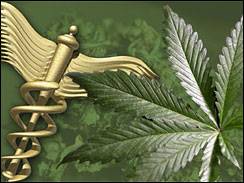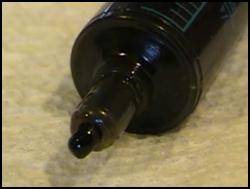- Cannabinoids as therapeutics
- Marijuana and the cannabinoids
- Cannabinoids
- The medicinal uses of cannabis and cannabinoids
- Endocannabinoids: the brain and body’s marijuana and beyond
- Marihuana reconsidered
- Marihuana, the forbidden medicine
- The great book of hemp: the complete guide to the environmental, commercial …
- Cannabis and cannabinoids: pharmacology, toxicology, and therapeutic potential
- Hemp for health: the medicinal and nutritional uses of Cannabis sativa
- Hemp: lifeline to the future : the unexpected answer for our environmental …
- The emperor wears no clothes
Tag: marijuana
US: AMA calls for review of the ban to use cannabis for medicinal purposes
The American Medical Association on their meeting on 8-10 November in Houston voted to reverse its long-held position that marijuana be retained as a Schedule I substance with no medical value. Schedule I is the only classification of controlled substances that may not be prescribed by a physician. The Medical Association adopted a report drafted by its Council on Science and Public Health entitled, “Use of Cannabis for Medicinal Purposes,” which affirmed the therapeutic benefits of cannabis and called for further research.
This report concluded that, “short term controlled trials indicate that smoked cannabis reduces neuropathic pain, improves appetite and caloric intake especially in patients with reduced muscle mass, and may relieve spasticity and pain in patients with multiple sclerosis.” The resolution says that the Medical Association “urges that marijuana’s status as a federal Schedule I controlled substance be reviewed with the goal of facilitating the conduct of clinical research and development of cannabinoid-based medicines. This should not be viewed as an endorsement of state-based medical cannabis programs, the legalization of marijuana, or that scientific evidence on the therapeutic use of cannabis meets the current standards for a prescription drug product.”
Further information:
– www.ama-assn.org/assets/meeting/mm/i-09-statements-recommendations.pdf
– AmericansForSafeAccess.org/downloads/AMA_Report_Executive_Summary.pdf
(Sources: Website of the American Medical Association, Americans for Safe Access, UPI of 10 November 2009)
IACM: cannabis-med.org/english/bulletin/ww_en_db_cannabis_artikel.php?id=309#3
“Did Anyone Consult the AMA?”
However, even within his controlled Committee hearings, many expert witnesses spoke out against the passage of these unusual tax laws.
Dr. William C. Woodward, for instance, who was both a physician and an attorney for the American Medical Association, testified on behalf of the AMA.
He said, in effect, the entire fabric of federal testimony was tabloid sensationalism! No real testimony had been heard! This law, passed in ignorance, could possibly deny the world a potential medicine, especially now that the medical world was just beginning to find which ingredients in cannabis were active.
Woodward told the committee that the only reason the AMA hadn’t come out against the marijuana tax law sooner was that marijuana had been described in the press for 20 years as “killer weed from Mexico.”
The AMA doctors had just realized “two days before” these spring 1937 hearings, that the plant Congress intended to outlaw was known medically as cannabis, the benign substance used in America with perfect safety in scores of illnesses for over one hundred years.
“We cannot understand yet, Mr. Chairman,” Woodward protested, “why this bill should have been prepared in secret for two years without any intimation, even to the profession, that it was being prepared.” He and the AMA* were quickly denounced by Anslinger and the entire congressional committee, and curtly excused.3
* The AMA and the Roosevelt Administration were strong antagonists in 1937.
When the Marijuana Tax Act bill came up for oral report, discussion, and vote on the floor of Congress, only one pertinent question was asked from the floor: “Did anyone consult with the AMA and get their opinion?” Representative Vinson, answering for the Ways and Means Committee replied, “Yes, we have. A Dr. Wharton [mistaken pronunciation of Woodward?] and [the AMA] are in complete agreement!”
With this memorable lie, the bill passed, and became law in December, 1937. Federal and state police forces were created, which have incarcerated hundreds of thousands of Americans, adding up to more than 16 million wasted years in jails and prisons – even contributing to their deaths – all for the sake of poisonous, polluting industries, prison guards unions and to reinforce some white politicians’ policies of racial hatred
(Mikuriya, Tod, M.D., Marijuana Medical Papers, 1972; Sloman, Larry, Reefer Madness, Grove Press, 1979; Lindesmith, Alfred, The Addict and the Law, Indiana U. Press; Bonnie & Whitebread; The Marijuana Conviction, U. of VA Press; U.S. Cong. Records; et al.)
3. Bonnie, Richard & Whitebread, Charles, The Marijuana Conviction, Univ. of Virginia Press, 1974; Congressional testimony, 1937 (See full testimony in Appendix); et al.
Professor Grinspoon on Marijuana, History, Chemistry, Pharmacology, Intoxicant, Medicine
Professor Grinspoon originally endeavored to write Marijuana Reconsidered in order to build a case against marijuana, but as his research progressed, he realized the complexities of the plant and was moved to advocate for legalization. He has testified before Congress, and as an expert witness in various legal proceedings, including the deportation hearings of John Lennon.
Lester Grinspoon is Associate Professor Emeritus of Psychiatry at Harvard Medical School and the author of several drug-related books, including Marijuana Reconsidered, Psychedelic Drugs Reconsidered, and Marijuana: The Forbidden Medicine. The first two were published during the 1970s, when it appeared cannabis was well on its way to nationwide decriminalization in the United States. The latter was published in 1993. It describes a variety of ailments for which cannabis ingestion may be indicated.
Websites:
Professor Lester Grinspoon – Marijuana Reconsidered:
MP3: grinspoon_lester_marijuana_medicinal_recreational_enhancement_june_16_09.mp3
One Radio Network:
oneradionetwork.com/health_-_podcasts/healing_modalities/professor_grinspoon_on_marijuana,_history,_chemistry,_pharmacology,_intoxicant,_medicine
Internet Archive:
archive.org/details/ProfessorGrinspoonOnMarijuanaHistoryChemistryPharmacologyIntoxicant
CA Medical Marijuana Ahimsa
AHIMSA INTERNATIONAL Presents:
Medical Cannabis and the California Crisis
A medical marijuana documentary from Northern California.
Ahimsa International: ahimsainternational.org
ahimsainternational.org/programs/mcsp/about/index.php
Veoh: browse/videos/category/educational_and_howto/watch/v18539632mK5kgswp
blip.tv: file/2183049
Run From The Cure – The Rick Simpson Story
A Film By Christian Laurette
After a serious head injury in 1997, Rick Simpson sought relief from his medical condition through the use of medicinal hemp oil. When Rick discovered that the hemp oil (with its high concentration of T.H.C.) cured cancers and other illnesses, he tried to share it with as many people as he could free of charge – curing and controlling literally hundreds of people’s illnesses…
- runfromthecure: http://sites.google.com/site/phoenixtearsmovie
- YouTube: http://www.youtube.com/view_play_list?p=E4CECCD85282A28A
Veoh: browse/videos/category/educational_and_howto/watch/v18541593Ff2fsCrw
BBC Horizon: A Look At Medicinal Cannabis & Sativex UK
“A look at the development of SATIVEX, the cannabis derived medicine being grown at the secret location known as Porton Down. Only now was the existence of CBD (Cannabidiol) and its anti-psychotic properties mentioned, and the claim made that some of the newer recreational strains contain no CBD at all (which isn’t actually correct, although CBD levels are low in some strains). A good case for the proper regulation of the commercial trade was almost made, but avoided.” – The UKCIA News Blog
Hemp Oil and Cancer
The medical science is strongly in favor of THC laden hemp oil as a primary cancer therapy, not just in a supportive role to control the side effects of chemotherapy.
Hemp oil can cheaply and effectively deliver a knock out blow to ones cancer.
According to Dr. Robert Ramer and Dr. Burkhard Hinz of the University of Rostock in Germany medical marijuana can be an effective treatment for cancer: salem-news.com/articles/january112008/cancer_treatment_11008.php
Their research was published in the Journal of the National Cancer Institute Advance Access on December 25th of 2007 in a paper entitled Inhibition of Cancer Cell Invasion by Cannabinoids via Increased Expression of Tissue Inhibitor of Matrix Metalloproteinases-1.
Full Article: jnci.oxfordjournals.org/cgi/content/full/100/1/59




